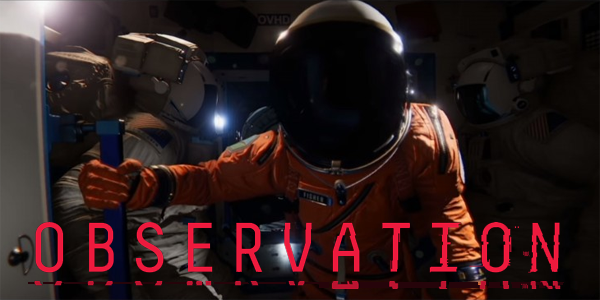
It's real refreshing to come across a science fiction game that isn't just about shooting aliens with laser guns or blowing up space ships. If you're in the market for a thoughtful, well-presented science fiction experience, then I highly recommend that you check out Observation. If you're also into horror, then even better, because this game definitely has some horror elements as well. They're much more subdued, but this game does do a fantastic job of creating a building sense of tension and intrigue as its over-arching mystery is slowly unfurled.
The gimmick here is that you play as a malfunctioning artificial intelligence on a near-future orbital research station. The game is presented as a sort-of found-footage narrative (think along the lines of the Apollo 18 horror movie) told entirely from the point of view of the on-board A.I. Something goes wrong, the crew are all missing and possibly dead, and you help the sole survivor try to find the remaining crew and piece together what happened to the station. Think along the lines of playing as the HAL 9000 from 2001: A Space Odyssey, or as Kevin Spacey's character in the [fantastic] movie Moon. You do this by jumping between different surveillance cameras (a la Five Nights at Freddy's, but, you know, with ambitions of being more than just a random jump-scare-generator). Through the cameras, you interact with various technology and station systems within your line of sight. You'll occasionally be asked questions or given commands by the surviving astronaut, and you chose how to respond.
You are an unreliable A.I.?
From the start, there's a certain degree of unreliable narrator going on. One of the very first actions that the game asks you to do is verify the identify of the surviving astronaut via her voice print. You are initially told that her voice print does not match, and you're given the option to accept or reject her voice print. If you reject, she'll repeat her authorization code, and you'll be told that it matches this time. Is she not who she seems? Are your own systems providing you with misleading information? Are your systems merely damaged? This creates an immediate sense of distrust. You (the player) don't necessarily trust the survivor, the survivor doesn't necessarily trust you, and you can't even trust your own perception and judgement.
From the start, it's unclear whether you can trust Emma, or whether she can trust you...
This immediately creates a dense atmosphere of intrigue and mystery and sets a level of tension that persists through the entire game.
This atmosphere is helped by the richly-detailed near-future space station that you inhabit. The visuals are immaculately detailed, and the station looks and feels like it could be modeled after the real-life International Space Station. The spaces are tight and claustrophobic. Accessories and stationary are strapped or velcroed to the walls, floors, ceiling, and desk surfaces in order to prevent them from floating off in the zero-gravity environment. Everything is believable.
The game further builds its atmosphere with its immersive U.I.. Every button press, command, and interaction has some in-universe context behind it that helps to keep you in the mind-space of your A.I. character. The U.I. is mostly easy to use, and most actions feel intuitive.
This game hooked me in with its setting and atmosphere, and I just had to keep playing to find out what happened and where this would go!
The space station and U.I. are believable and immersive.
...
[More]